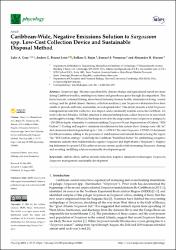Mostrar el registro sencillo del ítem
Caribbean-wide, negative emissions solution to Sargassum spp. low-cost collection device and sustainable disposal method
| Licencia | This is an open access article distributed under the terms and conditions of the Creative Commons Attribution (CC BY) license. | es |
| Autor | Gray, Luke A. | |
| Autor | Bisonó León, Andrés G. | |
| Autor | Rojas, Folkers E. | |
| Autor | Veroneau, Samuel S. | |
| Autor | Slocum, Alexander H. | |
| Fecha de admisión | 2024-08-20T22:24:49Z | |
| Fecha disponible | 2024-08-20T22:24:49Z | |
| Año | 2021 | |
| Citación | Gray, L. A., Bisonó León, A. G., Rojas, F. E., Veroneau, S. S., & Slocum, A. H. (2021). Caribbean-wide, negative emissions solution to Sargassum spp. low-cost collection device and sustainable disposal method. Phycology, 1(1), 49-75. Recuperado de: | es |
| URI | https://bvearmb.do/handle/123456789/5042 | |
| Sinopsis | Sargassum spp. blooms exacerbated by climate change and agricultural runoff are inundating Caribbean beaches, emitting toxic fumes and greenhouse gases through decomposition. This hurts tourism, artisanal fishing, shore-based industry, human health, standards-of-living, coastal ecology, and the global climate. Barriers, collection machinery, and Sargassum valorization have been unable to provide sufficient, sustainable, or widespread relief. This article presents a total Sargassum management system that is effective, low-impact, and economically scalable across the Caribbean. Littoral Collection Modules (LCMs), attached to artisanal fishing boats, collect Sargassum in nets which are brought to a barge. When full, the barge is towed to the deep ocean where Sargassum is pumped to ~150–200 m depth, whereafter it continues sinking (Sargassum Ocean Sequestration of Carbon; “SOS Carbon”). Costing and negative emissions calculations for this system show cleanup costs <$1/m3 and emissions reduction potential up to 1.356 → 3.029 tCO2e/dmt Sargassum. COVID-19 decimated Caribbean tourism, adding to the pressures of indebtedness and natural disasters facing the region. The “SOS Carbon strategy” could help the Caribbean “build back better” by establishing a negative emissions industry that builds resilience against Sargassum and flight shame (“flygskam”). Employing fishermen to operate LCMs achieves socioeconomic goals while increasing Sargassum cleanup and avoiding landfilling achieves sustainable development goals. | es |
| Idioma | English | es |
| Publicado | Phycology, 1(1), 49-75 | es |
| Derechos | © 2021 by the authors. Licensee MDPI, Basel, Switzerland. | es |
| URI de derechos | https://creativecommons.org/licenses/by/4.0/ | es |
| Materia | Recursos naturales - República Dominicana | es |
| Materia | Recursos costeros y marinos | es |
| Materia | Problemas ambientales | es |
| Materia | Emisiones de carbono | es |
| Título | Caribbean-wide, negative emissions solution to Sargassum spp. low-cost collection device and sustainable disposal method | es |
| dc.identifier.doi | https://doi.org/10.3390/phycology1010004 | |
| Tipo de material | Article | es |
| Tipo de contenido | Scientific research | es |
| Acceso | Open | es |
| Audiencia | Technicians, professionals and scientists | es |
Ficheros en el ítem
Este ítem aparece en la(s) siguiente(s) colección(es)
-
Investigación ambiental [1698]


